Room Partition Strategies in Dubai for Modern Spaces
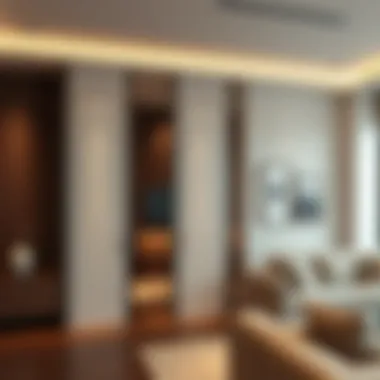
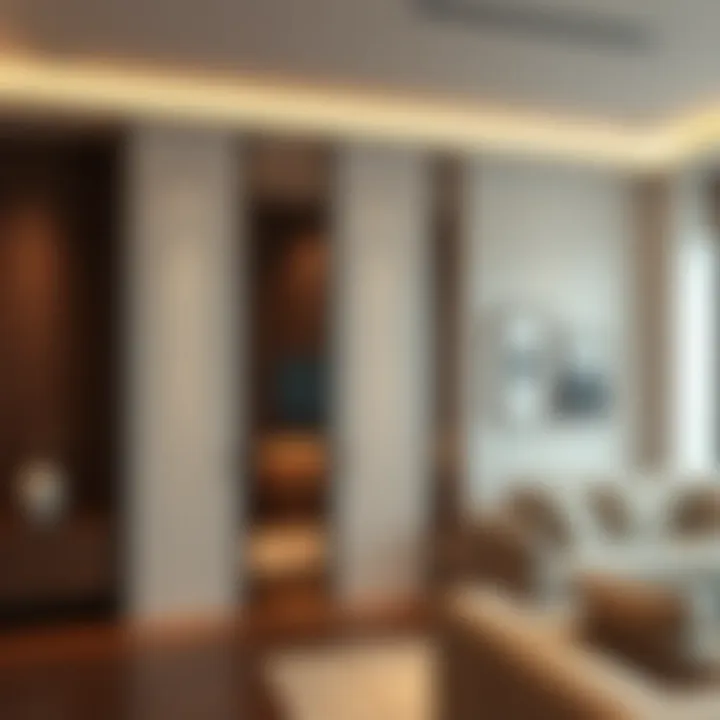
Intro
In the bustling metropolis of Dubai, where urban living often means navigating limited space, the demand for innovative room partition solutions has surged. It's not just about aesthetics or creating boundaries; it’s about effectively maximizing every square meter. Understanding this context is crucial for investors, homeowners, real estate agents, and developers who aim to thrive in the ever-evolving landscape of Dubai's real estate market.
Room partitioning renders a unique opportunity to redefine spaces, whether in homes or commercial offices. The advent of multifunctional designs and the ever-growing interest in smart home technology have almost transformed how we perceive and use our living and working environments.
With a tapestry of cultures and lifestyles woven into its fabric, Dubai presents a dynamism that fosters creativity in room partitioning. From folding screens that can vanish into thin air to glass walls that maintain an open feel while offering privacy, the options are diverse and tailored to meet the needs of modern urban living.
This section will unfold into several layers of insight, directing attention toward current market trends, investment opportunities, and the potential implications of smart technology in space management. A consultant's perspective on local regulations and recent consumer preferences will complement this narrative, offering a holistic view of what's available and what's emerging in the market for room partition solutions.
As we delve deeper into the characteristics and complexities of room partitioning, it becomes essential to grasp how to harness these solutions not only to beautify spaces but to enhance functionality and comfort. Get ready to explore the versatile solutions that are shaping modern living in the heart of Dubai.
Preamble to Room Partitioning
Room partitioning is not just about dividing spaces; it’s about creating functional environments tailored to our modern lifestyles. In the bustling metropolis of Dubai, where living spaces can often come at a premium, understanding this concept becomes vital. The use of room partitions enables homeowners and businesses alike to maximize their square footage while maintaining the desired level of privacy and interaction.
Understanding Room Partitions
At its core, a room partition acts as a divider within a larger space, offering a way to design areas for specific functions without the need for permanent structural changes. These partitions can vary greatly in style, ranging from traditional solid walls to contemporary movable screens or glass dividers that let light flow freely. Several benefits arise from their use. Not only do they provide flexibility in how spaces are utilized, but they also allow residents and workers to adapt their environments in response to changing needs. For example, an open-plan office may incorporate partitions to create quiet zones for focused work or meeting areas, while a small apartment might use a sliding panel to craft a guest room from the living area.
With Dubai’s unique cultural blend and rapid urban development, innovative room partition solutions have become more relevant than ever. Many homeowners seek to reflect their personal style while also considering functional aspects, making room partitioning a key element in modern design.
Historical Context of Space Utilization in Dubai
Dubai's approach to space has evolved significantly over the years. Initially, traditional Emirati homes featured straightforward designs with clear divisions intended for privacy, reflecting both cultural norms and the climate. Over time, as the city became an international hub attracting a plethora of residents from diverse backgrounds, the demand for more versatile living arrangements soared.
Today, architectural styles in Dubai showcase a fusion of contemporary design and practical space utilization. Skyscrapers tower above, offering compact apartments with clever partitioning solutions embedded within their designs. This evolution illustrates not just an architectural transformation but also a shift in how space is perceived. Modern Dubai embraces an ethos that champions functionality alongside aesthetic appeal, reinforcing the need for effective room partitioning as a staple in both residential and commercial settings.
As a fused result of these historical changes, the landscape of room partitioning in Dubai is rich, providing varied options that cater to both personal tastes and evolving market demands.
Types of Room Partitions
When it comes to modern living in Dubai, understanding the various types of room partitions is crucial. This knowledge helps not just in maximizing the available space, but also in enhancing the overall aesthetic and functionality of any environment, whether it’s a cozy apartment or a bustling office. Opting for the right type can make all the difference, catering to the unique needs and lifestyle preferences of the inhabitants.
Permanent vs. Temporary Solutions
Choosing between permanent and temporary solutions is the first step in deciding how to divide spaces effectively. Permanent partitions, as the name suggests, are fixtures that involve more elaborate construction, often consisting of materials like drywall or masonry. They offer durability and soundproofing, making them ideal for offices needing confidentiality or homes aiming for long-term space division. On the flip side, temporary solutions like room dividers made from lightweight materials or foldable screens can be easily set up and taken down. These provide flexibility for those who may need to alter their layout frequently.
- Benefits of Permanent Partitions:
- Advantages of Temporary Dividers:
- Robust structure that lasts longer
- Better sound insulation
- Increased property value
- Flexibility to change layouts on a whim
- Cost-effective, requiring lower upfront investment
- Quick installation and dismantling
This juxtaposition allows homeowners and businesses to select what fits their needs, whether it’s maintaining a fixed layout or adapting to changing circumstances.
Fixed Wall Partitions
Fixed wall partitions are typically constructed to create solid rooms within larger spaces. These are ideal for places where permanent separation is needed, as in private offices or therapy rooms. Commonly, they are made from materials like gypsum board or masonry, enabling them to provide sound insulation and a sense of permanence. Nevertheless, they impose a structure that may not align with a tenant's need for flexibility.
Considerations when choosing fixed wall partitions include:
- Building Codes: Ensuring compliance with local regulations is critical.
- Cost implications: Fixed partitions involve more upfront costs and labor.
- Aesthetic integration: How well do these partitions blend with existing décor?
Choosing fixed options signifies a long-term investment into space functionality, but might not suit everyone’s needs.
Movable Partitions
Movable partitions serve a different ethos by allowing adaptability and customization. These partitions can be wheeled or folded away, giving more fluidity to the space. For example, an office with movable partitions can convert an expansive area into smaller meeting rooms simply by sliding panels. This option is popular for events spaces or shared work environments where flexibility is a priority. However, it's noteworthy to consider their soundproofing capabilities, which can be less than those of fixed walls.
Benefits of movable partitions include:
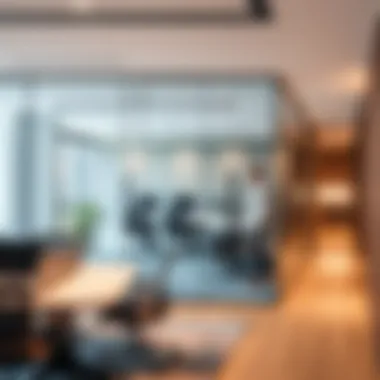
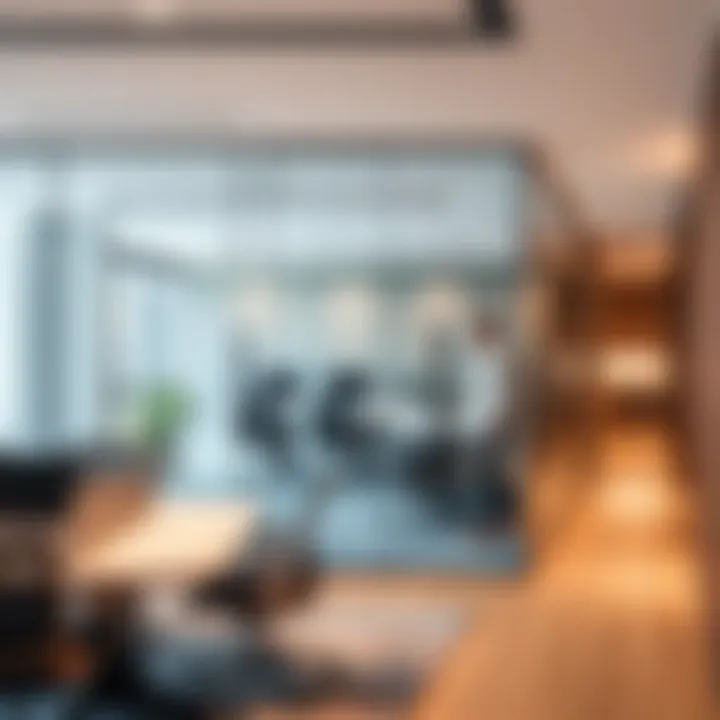
- Flexibility: Change layouts as per need, fostering collaboration in open spaces.
- Economical Solutions: Generally less costly than fixed installations.
- Ease of Installation: Quick setup means less downtime for businesses.
Screens and Panels
Screens and panels, often made from materials like fabric, glass, or wood, provide a stylish way to divide spaces. They can be artistic, adding a touch of flair to the environment. Lightweight and portable, screens can be moved as needed, allowing effective space management. Particularly in homes, they create zones without full enclosures, promoting airy and collaborative feelings within the space.
Moreover, screens and panels are perfect for:
- Visual Agreements: While providing separation, they still allow light to pass, maintaining an open feel.
- Cost-Effective: Typically more affordable than solid partitions.
- Custom Design Options: Easily available in various styles and colors to fit individual tastes.
"Choosing the right type of partition can drastically alter both the utility and ambience of a space."
In Dubai’s contemporary living settings, the variety in types of partitions caters to diverse needs—be it privacy, aesthetic appeal, or flexibility.
Understanding the roles of these partitions helps stakeholders make informed decisions, setting a strong foundation for optimizing both residential and commercial environments.
Material Choices for Partitions
When it comes to room partitioning in Dubai, the selection of materials plays a pivotal role in achieving the desired functionality and aesthetic appeal. Each material brings its own set of advantages, limitations, and characteristics that can directly impact the ambiance of a space. Choosing the right material not only influences the look and feel of a room but also affects durability, maintenance, sound insulation, and even how well it fits within building regulations. In this section, we will delve into four primary materials commonly used for partitions: wood, glass, gypsum board, and metal. Each of these materials has unique properties that cater to different tastes and purposes, which makes it essential to understand their implications before making an investment.
Wooden Partitions
Wooden partitions have long been favored for their warmth and natural beauty. They can create a cozy atmosphere, making them ideal for settings such as residential homes or boutique-style offices. Wooden partitions can be crafted in various styles, from classic to contemporary, thereby accommodating a range of interior designs.
Moreover, wood is a sustainable choice when sourced responsibly, which appeals to environmentally conscious consumers.
However, one must keep in mind the necessary upkeep involved with wooden materials. They may require periodic treatments to combat wear and moisture, especially in a humid environment like Dubai. Additionally, wooden partitions tend to be less soundproof than other options, which could be a consideration for settings needing enhanced privacy. Overall, wooden partitions offer a stylish, albeit slightly higher-maintenance, solution for those looking to divide spaces effectively.
Glass Partitions
Glass partitions introduce a sense of openness that other materials cannot quite match. They allow natural light to permeate spaces, making rooms feel larger and more airy, which is often a crucial factor in urban environments like Dubai. There are several types of glass partitions, including frosted options for more privacy without sacrificing style.
One of the most significant advantages of this material is its ability to bring a modern touch to any space. Most offices, cafes, and showrooms see the merit of incorporating glass for a sleek, professional look that invites collaboration while still dividing areas effectively. On the downside, glass partitions can be more costly and may require additional safety measures — such as tempered glass — to prevent breakage. They also necessitate cleaning and maintenance to retain their clarity and visual appeal.
Gypsum Board Partitions
Gypsum board partitions, commonly known as drywall, present a highly versatile option for room division. This material is lighter than both wood and metal yet offers commendable strength, making it suitable for various applications, from residential walls to commercial offices. Gypsum boards can be painted and finished in numerous ways, allowing for a tailored fit within any decor.
In terms of cost-effectiveness, gypsum boards often come out as a winner; they are typically more affordable than both wood and glass. They can also provide decent sound insulation, an essential factor in shared living or working spaces. One drawback is that gypsum board isn't as durable as other options; it's prone to dents and scratches. On a further note, it may not fare well in highly humid environments unless treated specially.
Metal Partitions
Metal partitions are becoming increasingly popular in Dubai, especially in commercial settings. Characterized by their durability and modern aesthetic, metal solutions can range from polished aluminum to galvanized steel. This material's robustness makes it an excellent choice for environments requiring high levels of wear resistance, such as offices and industrial complexes.
Metal partitions can also be designed in various configurations, including movable systems that allow for flexibility in space management. Furthermore, they excel when it comes to fire resistance, adding another layer of safety in urban buildings.
However, metal can have a cold appearance, which may not work well for those looking to create a warm, inviting atmosphere. They can also be more expensive than other partition materials, making budgeting a significant consideration for potential buyers.
Design Considerations
In the context of room partitioning, design considerations play a crucial role in ensuring that the partitions not only meet practical needs but also enhance the overall living or working environment. In Dubai, where space is often at a premium, thoughtful design becomes even more significant. This section delves into the critical elements surrounding aesthetics, functionality, and integration with existing interiors, offering a comprehensive perspective on why these factors cannot be overlooked.
Aesthetic Appeal
When it comes to room partitions, the visual impact is often the first thing occupants notice. The choice of materials, colors, and layout can transform a space from mundane to striking. In Dubai's diverse architectural landscape, incorporating partitions that reflect local culture while remaining contemporary can elevate a property's value.
- Material Selection: Selecting the right material can define the aesthetic both immediately and long-term. For instance, glass partitions often encourage a sense of openness while allowing natural light to spill into various spaces, lending a clean and modern aesthetic.
- Color Schemes: The color palette chosen for the partition can blend seamlessly with existing decor while also injecting a splash of personality. Neutral tones can create a calm environment, while bolder colors may create a more dynamic atmosphere.
- Patterns and Textures: Unique patterns or textures on wooden or fabric partitions can introduce depth and dimension to spaces, making them more visually interesting and inviting. This is particularly relevant in both residential and commercial settings, where first impressions matter.
Functionality and Privacy
While aesthetics are important, functionality and privacy are the backbone of effective room partitions. Their primary goal is to create spaces that serve specific purposes without sacrificing comfort or accessibility. In this bustling city, where families and professionals seek solace from daily chaos, partitions must strike a balance between openness and seclusion.
- Zoning Your Space: Well-placed partitions can help delineate areas for work, relaxation, or dining. In a contemporary Dubai apartment, a room divider could separate a cozy living space from a home office, ensuring a clear boundary without compromising on light or air flow.
- Sound Control: Some materials can enhance soundproofing, creating a peaceful atmosphere necessary for both productivity and relaxation. Acoustic panels, for example, can reduce noise and increase focus in increasingly popular open-office configurations.
- Flexibility in Use: The best partitions adapt over time. Movable walls or screens allow for easy reconfiguration, changing the room’s purpose based on current needs. This adaptability is a selling point for many buyers and renters in Dubai's fast-paced real estate market.
Integration with Existing Interiors
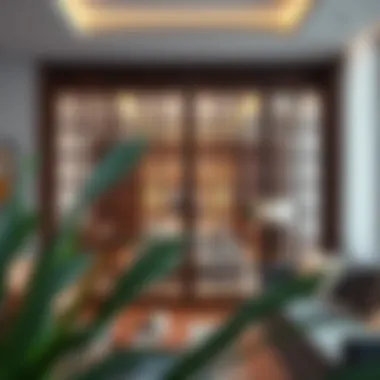
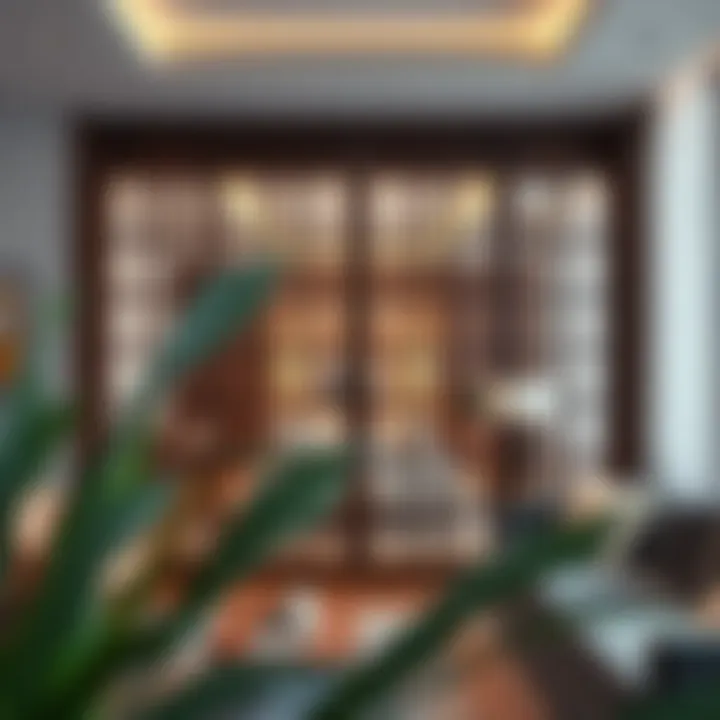
To achieve a harmonious living or working environment, it's essential that room partitions integrate smoothly with existing interiors. An ill-fitting partition can disrupt the flow of a space, while a well-designed one enhances the overall aesthetic.
- Design Cohesion: Partitions should complement existing furniture and decor, ensuring a unified look. For example, a sleek glass partition can match modern furnishings, while a wooden partition may be better suited for a more traditional aesthetic.
- Architectural Features: Consideration should also be given to architectural details like windows, doors, and built-in shelves. The placement of a partition should account for these features, enhancing their visibility rather than obstructing them.
- Lighting Considerations: Properly designed partitions can influence how light moves throughout a space. Transparent or semi-transparent materials facilitate better light flow, which is particularly beneficial in a city as sun-drenched as Dubai. Smart lighting solutions can also be integrated alongside partitions to further enhance the ambiance.
The right design considerations for room partitions can mean the difference between a space that feels cramped and one that feels welcoming and spacious.
Overall, understanding the pivotal elements of design considerations in room partitioning sets the stage for creating well-defined, functional, and aesthetically pleasing spaces tailored to the needs of modern living in Dubai. Designing with care not only improves immediate usability but can also significantly boost property value and user satisfaction.
Benefits of Room Partitions
When it comes to modern living in bustling cities like Dubai, maximizing available space has become a vital necessity. Room partitions serve as an innovative solution to numerous challenges that arise in both residential and commercial settings. Employing partitions cleverly allows individuals and businesses to shape their environments, meeting their specific needs. Here, we will delve into the critical benefits of room partitions, emphasizing the key aspects like space optimization, privacy enhancement, and acoustic control.
Space Optimization
Space optimization is at the forefront of why many choose to implement room partitions in their homes or offices. With the rapid growth of urban centers, housing options are becoming tighter, pushing for smarter use of every square meter.
Partitions effectively allow for functionality in limited spaces. Instead of seeing a vast, open area as daunting, one can create multiple distinct zones suitable for different activities. For instance, in a studio apartment in Dubai, a simple wooden partition can be the difference between a cozy bedroom and a working area. The segmentation promotes efficiency, allowing for several uses in one space without feeling cramped.
Moreover, businesses can adapt their workspaces to match changing demands. Many companies are embracing flexible office designs utilizing movable partitions. This adaptability allows for dynamic reconfigurations of workspaces, catering to collaborative teamwork or focused individual tasks with ease.
"Effective space optimization leads to improved productivity and overall satisfaction in living and working environments."
Enhanced Privacy
Enhanced privacy is perhaps one of the most immediate advantages of integrating partitions into your environment. With the growing trend of open-plan designs, there's no doubt that while they promote socialization, they might inadvertently create invasions of personal space.
Consider a scenario in a Dubai office where workers share a large floor space. An employee engaged in a critical phone call would surely benefit from a partition providing visual and auditory privacy. This barrier reduces distractions and interruptions, thus contributing to a more focused work environment.
For residential settings, privacy is just as essential. A well-placed partition allows family members to coexist comfortably without infringing on one another's personal space. For instance, couples can share living areas while still enjoying moments of solitude. It transforms a single room into a mini sanctuary, fostering well-being.
Acoustic Control
Finally, let's discuss acoustic control, another significant benefit of room partitions. With the lively atmosphere of Dubai, noise can often become a nuisance, especially in populated areas. Partitions, depending on their material and design, can help mitigate sound transmission.
For example, glass partitions with acoustic properties can enhance sound insulation between conference rooms, allowing meetings to take place without eavesdropping from adjacent spaces. This is particularly crucial in commercial settings where privacy during discussions can influence outcomes. In residential places, acoustic control helps prevent distractions from children playing or street noise infiltrating personal spaces, creating a tranquil home atmosphere.
Room partitions are more than just aesthetic choices; they embody a thoughtful approach to living, working, and interacting in today's evolving spaces. Whether optimizing for space, ensuring privacy, or controlling sound, the benefits are hard to overlook. Investing in partitions symbolizes an investment in quality of life, making environments in Dubai more livable and conducive to each individual's needs.
Room Partition Trends in Dubai
Room partitioning trends in Dubai reflect a dynamic fusion of practicality and style. With the growing demand for flexible living and working spaces, modern partitions are not just about dividing areas; they are about enhancing the overall quality of life in urban settings. When we delve into this topic, we see how innovative solutions respond to the fast-paced lifestyle in the region, providing both functionality and aesthetics.
Innovative Designs
Urban spaces are becoming increasingly creative in their approach to room partitioning. As families and businesses seek to maximize every inch, designers are stepping up with smart, multifunctional solutions. Today, room partitions can serve more than just a dividing role; they can integrate shelving, lighting, and even greenery, allowing areas to breathe while maintaining their distinct purposes. For instance, a stylish bookcase might separate a home office from a living area, providing storage and visual appeal simultaneously.
- Biophilic Design: Incorporating plant life into partitions, not only beautifies a space but also purifies air and fosters a calming environment. Think of a partition adorned with climbing plants or complemented by vertical gardens.
- Artistic Touches: Local artists and designers are becoming involved, creating partitions that double as art pieces. This trend not only personalizes spaces but also reflects the cultural richness of Dubai, showcasing local craftsmanship and aesthetics.
Moreover, movable partitions have gained popularity in Dubai. These designs allow spaces to transform at a moment’s notice. For quick meetings or gatherings, a simple slide or fold turns one room into a more spacious area.
Sustainability in Materials
Sustainability continues to be a hot-button issue across various sectors, and the realm of room partitioning is no exception. As the world becomes increasingly aware of its environmental impact, the demand for eco-friendly materials in construction and design has surged. For example, partitions made from recycled materials not only cut costs but also reduce waste, making them a prime choice for conscientious designers and builders.
- Bamboo and Reclaimed Wood: Both of these materials offer natural beauty and a low carbon footprint. Using bamboo—known for its rapid growth and renewability—as a primary material is particularly appealing.
- Recycled Glass: This is another material that's gaining traction. Glass partitions made from recycled sources maintain elegance while also promoting a sustainable future.
As Dubai pushes toward a greener future, local regulations increasingly support sustainable practices. Builders and developers are now actively looking to integrate these materials into their projects, recognizing that consumers are drawn to eco-friendly solutions.
Technological Integration
Dubai is known for its love of technology, and this inclination has seamlessly integrated into the world of room partitions. Advances such as smart glass and automated systems have transformed how spaces are separated and utilized. Smart glass can switch from transparent to opaque with a simple touch, providing privacy when necessary, while still allowing light to flow through—a perfect solution for both residential and commercial environments.
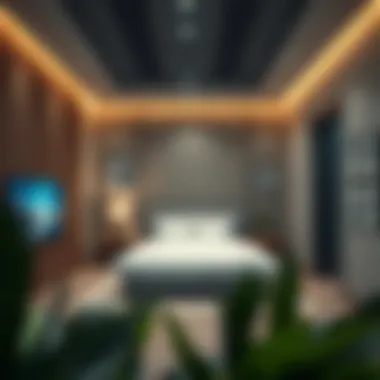
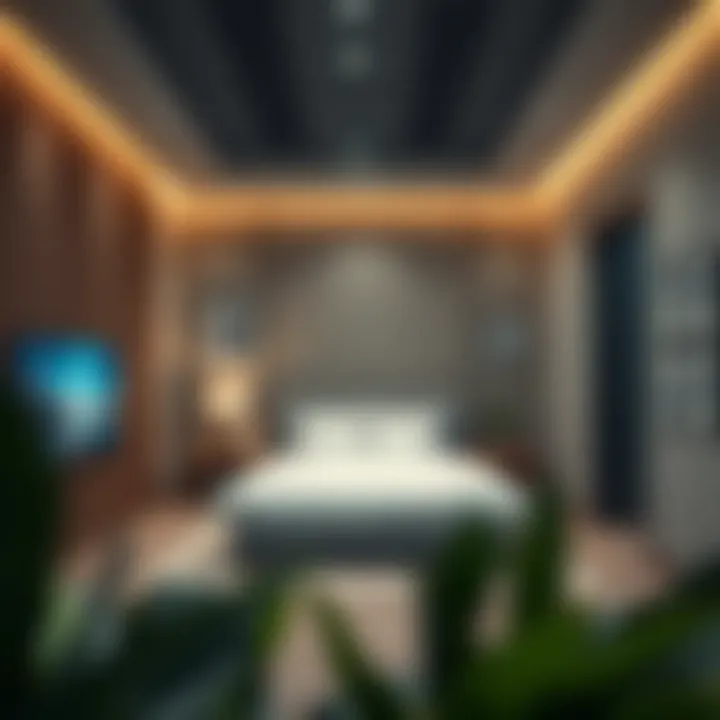
- Automated Panel Systems: These systems can slide or fold away, adapting to the needs of the moment. Imagine a workspace that can morph into a meeting room or a casual lounge in seconds, all with the press of a button.
- Sound-absorbing Technologies: Modern partitions are also fitted with sound insulation technologies, meeting the need for privacy in urban settings. This ensures that conversations between office cubicles or in residential apartments remain contained, which is a boon for maintaining a serene environment in bustling Dubai.
Investing in technologically integrated room partitions not only enhances functionality but also increases property value. It’s a compelling move for developers and homeowners alike.
Legal and Regulatory Considerations
When it comes to room partitioning in Dubai, understanding the legal and regulatory environment is crucial. This aspect not only dictates what is permissible in terms of design and materials but also affects the functionality and safety of the space. Navigating through building codes and standard regulations is essential for anyone looking to install partitions in their homes or commercial spaces.
Building Codes and Standards
Building codes in Dubai are designed to ensure safety, sustainability, and aesthetic integrity within the urban landscape. These guidelines establish the minimum requirements for construction, including room partitions, ensuring that any installation is safe and complies with local requirements.
- Safety Measures: Regulations address structural integrity, adhering to standards that ensure partitions can withstand environmental stresses.
- Material Guidelines: Building codes may specify certain materials that can or cannot be used, influencing choices in both residential and commercial layouts.
- Accessibility: Compliance with accessibility guidelines is essential. Spaces must be designed to accommodate individuals with disabilities, suggesting that partitions should enhance, not hinder, movement.
In Dubai, various governmental bodies oversee the enforcement of these codes, providing stringent oversight on new constructions and renovations. Failing to adhere to these codes can lead to significant penalties, including costly fines and mandated rework on non-compliant installations. For peace of mind, it’s advisable to consult with a local architect or contractor who understands the nuances of these regulations.
Permitting Processes for Installations
Navigating the permitting process is another critical hurdle for anyone wishing to install room partitions. This process may seem daunting, yet understanding it is essential for avoiding costly delays and ensuring compliance with local regulations.
- Pre-Approval Consultations: Before beginning any project, consider consulting with building authorities. This can help identify necessary permits prior to initiating work.
- Document Submission: An application for a building permit generally requires detailed plans that illustrate the intended partitions, materials to be used, and how this aligns with existing structural plans.
- Inspections: After getting approval, expect inspections at various stages of the installation process. Some aspects may require compliance checks before moving on to the next phase.
- Final Approval: Once installations are complete, a final review ensures all regulations were adhered to before issuing the occupancy certificate.
Proper adherence to permitting processes not only avoids legal entanglements but can also protect the value of your investment, making it harder to overlook their significance.
Cost Implications
Understanding the cost implications of room partitioning is essential when considering how to enhance both residential and commercial spaces in Dubai. The investment in partitions can often be substantial, but it offers long-term advantages that justify the financial outlay. From budgeting for initial expenditures to evaluating long-term savings, getting a grip on these financial aspects can help stakeholders make informed decisions.
Budgeting for Room Partitions
When it comes to budgeting for room partitions, it's pivotal to account for several key elements. Materials, installation, and maintenance costs all play a significant role.
- Material Choice: Different materials like wood, glass, or metal come with varying price tags. For instance, while glass partitions can bring elegance, they might also increase the costs significantly compared to traditional wooden options.
- Functionality Requirements: Will the partition offer more than mere separation? If additional features like soundproofing or sliding mechanisms are required, then budget must reflect those needs.
- Installation Labor: Costs can skyrocket if specialized labor is needed. In Dubai, where skilled professionals can be in demand, it’s wise to gather quotes from various providers to find a reasonable rate.
Every decision made during the budgeting phase has a ripple effect on total costs. Keeping a flexible budget that accommodates unexpected expenses can be a lifesaver in this dynamic city.
Long-term Savings Through Efficiency
Investing in efficient room partitions can yield notable long-term savings that often outweigh initial expenses. Here are some ways that stakeholders can benefit:
- Energy Efficiency: Properly designed partitions can help manage temperature more effectively, lowering energy bills by reducing the workload on HVAC systems.
- Resource Optimization: Utilizing flexible, movable partitions allows a space to adapt for various purposes without requiring further investments in construction. This can significantly reduce remodeling costs over time.
- Increased Property Value: Well-designed and functional partitions can enhance the overall appeal of a property, leading to higher market value. Investors may find that effective space utilization can yield better returns when selling or renting out the property.
Incorporating these strategies not only optimizes financial resources but also emphasizes the importance of planning. As the real estate market in Dubai continually evolves, staying ahead of the curve with smart investment choices becomes crucial.
"The right room partition can not only redefine a space but also redefine your budget management strategy."
Investors, home buyers, and builders should always consider the cost implications and potential returns of room partitioning to navigate the complexities of Dubai's thriving real estate landscape.
Closure
Room partitioning is an essential aspect of modern living, especially in a bustling metropolis like Dubai. This article has delved deep into the realms of room partitions, exploring their designs, materials, and trends that cater specifically to the unique needs of urban life. Understanding the importance of this topic goes beyond mere aesthetics; it encompasses functionality, privacy, and space optimization in environments where every square foot counts.
Summary of Key Insights
Throughout this article, we've highlighted several key insights surrounding room partitioning:
- Types of Partitions: From permanent solutions like fixed walls to movable ones that allow for adaptability, it's evident that room partitions offer versatility that suits varied lifestyles and preferences.
- Materials Matter: Choices ranging from wood to glass can significantly affect not just the appearance, but also the acoustics and durability of a space. Selecting the right material can be crucial for both residential and commercial settings.
- Design as Functionality: Aesthetic appeal is vital, but equally important is how partitions impact the functionality of a space. Integrating partitions with existing interiors requires careful thought to maintain harmony.
- Benefits Abound: The advantages are plentiful, including enhanced privacy, better acoustic control, and optimized space, which are all critical in rapidly growing urban environments.
Room partitioning serves as a bridge between creativity and practicality, ensuring spaces are personal while addressing functionality.
The Future of Room Partitioning in Dubai
Looking ahead, the future of room partitioning in Dubai appears promising and is likely to evolve significantly. With the increasing emphasis on sustainability, materials that are eco-friendly will likely see more popularity. Building regulations may also adapt to support innovative designs that enhance living experiences while being kind to the environment.
Moreover, technology integration is expected to play a more prominent role in the partitioning landscape. Smart partitions equipped with soundproofing capabilities or adjustable opacity glass could redefine privacy and comfort.
Investors and developers in the region will have plenty of opportunities to leverage these trends. Understanding market needs and consumer preferences will be pivotal to success. As Dubai continues to grow and develop, so too will the strategies used in partitioning, making this an essential area of focus for architects and designers.
This exploration underscores that effective room partitioning goes beyond just dividing spaces; it's about enriching experiences and optimizing the way we live and work. As this field continues to evolve, keeping an eye on emerging trends and adapting to them will be crucial for anyone involved in real estate or design in Dubai.











